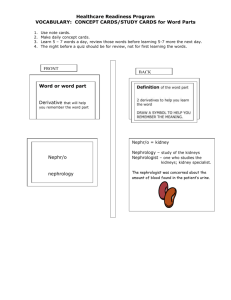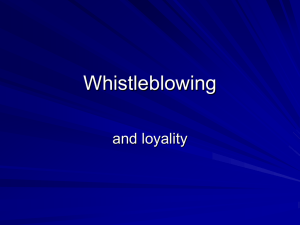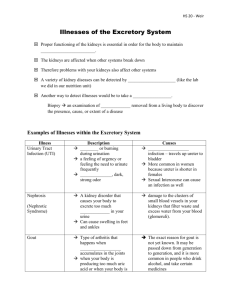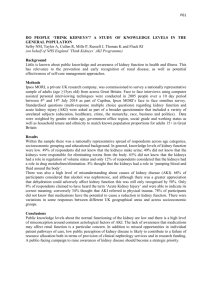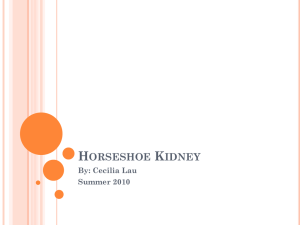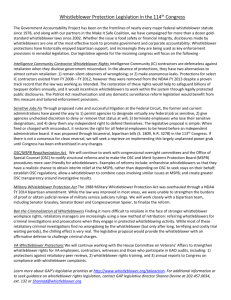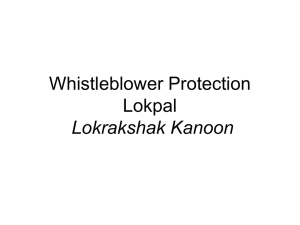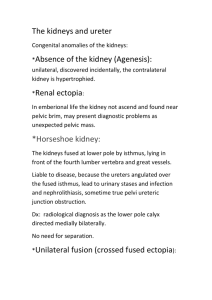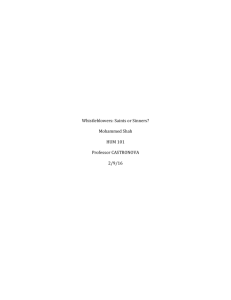Ethics of 3D BioPrinting - University of Pittsburgh
advertisement
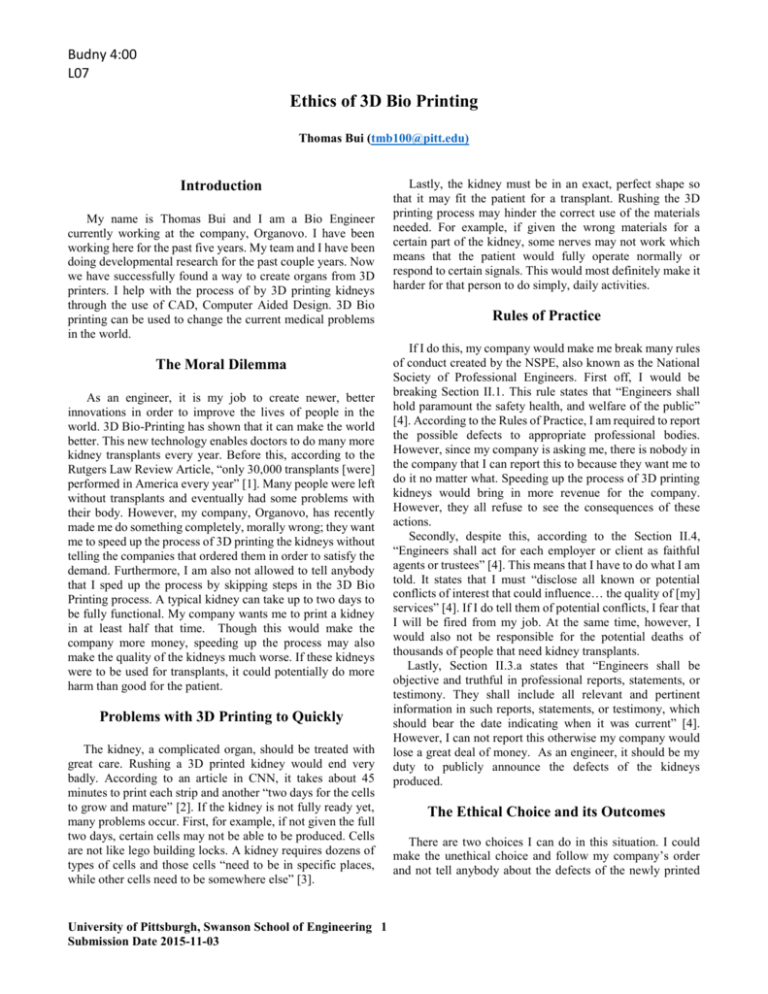
Budny 4:00 L07 Ethics of 3D Bio Printing Thomas Bui (tmb100@pitt.edu) Introduction My name is Thomas Bui and I am a Bio Engineer currently working at the company, Organovo. I have been working here for the past five years. My team and I have been doing developmental research for the past couple years. Now we have successfully found a way to create organs from 3D printers. I help with the process of by 3D printing kidneys through the use of CAD, Computer Aided Design. 3D Bio printing can be used to change the current medical problems in the world. The Moral Dilemma As an engineer, it is my job to create newer, better innovations in order to improve the lives of people in the world. 3D Bio-Printing has shown that it can make the world better. This new technology enables doctors to do many more kidney transplants every year. Before this, according to the Rutgers Law Review Article, “only 30,000 transplants [were] performed in America every year” [1]. Many people were left without transplants and eventually had some problems with their body. However, my company, Organovo, has recently made me do something completely, morally wrong; they want me to speed up the process of 3D printing the kidneys without telling the companies that ordered them in order to satisfy the demand. Furthermore, I am also not allowed to tell anybody that I sped up the process by skipping steps in the 3D Bio Printing process. A typical kidney can take up to two days to be fully functional. My company wants me to print a kidney in at least half that time. Though this would make the company more money, speeding up the process may also make the quality of the kidneys much worse. If these kidneys were to be used for transplants, it could potentially do more harm than good for the patient. Problems with 3D Printing to Quickly The kidney, a complicated organ, should be treated with great care. Rushing a 3D printed kidney would end very badly. According to an article in CNN, it takes about 45 minutes to print each strip and another “two days for the cells to grow and mature” [2]. If the kidney is not fully ready yet, many problems occur. First, for example, if not given the full two days, certain cells may not be able to be produced. Cells are not like lego building locks. A kidney requires dozens of types of cells and those cells “need to be in specific places, while other cells need to be somewhere else” [3]. University of Pittsburgh, Swanson School of Engineering 1 Submission Date 2015-11-03 Lastly, the kidney must be in an exact, perfect shape so that it may fit the patient for a transplant. Rushing the 3D printing process may hinder the correct use of the materials needed. For example, if given the wrong materials for a certain part of the kidney, some nerves may not work which means that the patient would fully operate normally or respond to certain signals. This would most definitely make it harder for that person to do simply, daily activities. Rules of Practice If I do this, my company would make me break many rules of conduct created by the NSPE, also known as the National Society of Professional Engineers. First off, I would be breaking Section II.1. This rule states that “Engineers shall hold paramount the safety health, and welfare of the public” [4]. According to the Rules of Practice, I am required to report the possible defects to appropriate professional bodies. However, since my company is asking me, there is nobody in the company that I can report this to because they want me to do it no matter what. Speeding up the process of 3D printing kidneys would bring in more revenue for the company. However, they all refuse to see the consequences of these actions. Secondly, despite this, according to the Section II.4, “Engineers shall act for each employer or client as faithful agents or trustees” [4]. This means that I have to do what I am told. It states that I must “disclose all known or potential conflicts of interest that could influence… the quality of [my] services” [4]. If I do tell them of potential conflicts, I fear that I will be fired from my job. At the same time, however, I would also not be responsible for the potential deaths of thousands of people that need kidney transplants. Lastly, Section II.3.a states that “Engineers shall be objective and truthful in professional reports, statements, or testimony. They shall include all relevant and pertinent information in such reports, statements, or testimony, which should bear the date indicating when it was current” [4]. However, I can not report this otherwise my company would lose a great deal of money. As an engineer, it should be my duty to publicly announce the defects of the kidneys produced. The Ethical Choice and its Outcomes There are two choices I can do in this situation. I could make the unethical choice and follow my company’s order and not tell anybody about the defects of the newly printed Thomas Bui kidneys; or, I could make the ethical choice. With each choice there comes a consequence to each one. If I were to make the ethical choice, I would go to the people we were selling the kidneys to and tell them about the defects in the kidneys. In doing so, I would most likely be fired by my company. However, at the same time, I would be able to save thousands of people’s lives. The kidneys would not be able to be sold. Patients would have to go to another company to get kidney transplants and receive fully functional kidneys from there. Furthermore, while talking to my parents for advice, they highly encouraged me to take this option. My parents have a better perspective because they are older and have far more experience in the real world than I do. They told me that it is better to do the right thing even if it costs my job. Furthermore, if I ever did need help finding another job they could even help me with that. However, if I were to let the defects remain unknown, the guilt following the deaths of many people would never leave me. However, being a whistleblower has many negative consequences as well. In most cases, the charges brought forth from the whistleblower are often ignored. Since these would be serious allegations, the company could either start a cover up or the company could try to discredit me. Furthermore, becoming a whistleblower would mean that it “represents a failure on everybody’s part” [5]. Worst case scenario, I could be re-appointed to solve the current problem. My company would then “deny access to needed information and make [me] the scapegoat when wrongdoing persists” [5]. Though I am ethically doing the correct thing, the company may not see it that way and may in turn try to make be look like the bad guy. Outcomes from Similar Cases The life of a whistleblower becomes tough after he rats out his or her company. The term, “rat”, in itself, has a very negative connation to it. In life, we are taught that ratting others out is a bad thing. However, a professor of business ethics told Management Review that “We need to begin to turn tattletales into moral heroes” [6]. Furthermore, Donald R. Soeken states, “If you blow the whistle on somebody below you, you’ll get a pat on the back. Above you? You’ll be fired” [6]. The part about ratting our someone higher than you almost always end up being true. Despite all of this, there have been some happy endings for some whistleblowers. Chester Walsh was an employee at GE Aircraft Engine. He began collecting documents that were inconclusive throughout the mid 1980’s. He gathered evidence for four more years even wearing a wire at one point. By 1990, Walsh filed a suit against GE, “alleging that employees in GE’s aircraft division in Cincinnati, together with Israeli Brig. Gen. Rami Dotan, falsified documents to misdirect the $40 million originally meant for purchase… of F110 engines for F-16 fighters” [7]. As a whistleblower, Walsh was allowed to University of Pittsburgh, Swanson School of Engineering 2 Submission Date 2015-11-03 collect twenty-five percent of the money made from the suit which ended up being 13.4 million dollars. A. Ernest Fitzgerald was an Air Force financial analyst. In 1968, he reported a 2.3-billion-dollar cost overrun in the Lockheed C-5 aircraft program. Instead of taking the advice of Air Force officials, Fitzgerald decided to openly testify about the program. Instead of people thanking him, he was instead heavily criticized even by the president who was Nixon at the time. It was later reported that Nixon told his aides to “get rid of that son of a bitch” [7]. Furthermore, coworkers that disliked him called him “attic fanatics because of their cramped upper-floor Pentagon offices” [6]. However, after this ordeal, he became an advocate for whistleblower protection and helped enact the Civil Reform Act of 1978, a precursor to the Whistleblower Protection Act of 1989. Allan McDonald and Roger Boisjoly were engineers at Morton Thiokol Inc. They knew of the possible defects of the 1986 Challenger Shuttle and had told their superiors about them. They even tried to postpone the launch but to of no avail. However, after they ratted out their superiors the two felt “ostracized by colleagues who believed they had broken ranks and punished by their employer” [8]. After their testimonies, the two were reinstated but demoted to much lower paying jobs. However, by May of that year, William P. Rogers restored the two to their normal jobs. Despite being whistleblowers, McDonald now “appears to have been embraced once again by Thiokol” [8]. Due to the failure of the rocket launch, Thiokol’s reputation had been tarnished; but McDonald has become a “symbol of integrity and forthrightness” [8]. The Unethical Choice and its Outcomes Rather than making the ethical choice, I could choose to not tell anybody about the defects in the printed kidneys. From reading about previous cases, it is easier to not be a whistleblower. Whistleblowers live very difficult lives after their testimonies against their companies. It effects not just that person but also their friends and family. Firstly, testimonies take a great deal of time. Some cases have taken up to seventeen years. This is due to the the amount of cases that must be dealt with. The whistleblower must first prepare a statement and then file it with the government. Next, serve the Complaint and a Disclosure Statement with all the evidence on the government. If the government decides to intervene, one has a trial. This process could take up to years and is always a tortuous legal process. Furthermore, all files are under seal during the investigation. The whistleblower, I, would not be able to tell anybody about the current investigation including my friends and family resulting in great isolation as the case progresses. Secondly, the risk of losing a job is almost assured. If the whistleblower is not fired, they will most likely be moved to a position of lower stature. Of the three cases I brought up, Thomas Bui only one was able to retain his job. The rest were fired or ostracized by their previous co-workers. Lastly, the burden from whistleblowing is immense. There is so much stress involved in taking up a whistleblower case that death is a possibility. Furthermore, monetary rewards are rare and rarely life-changing. For example, Jim Holzrichter, a whistleblower, ratted out his company, Northrop, and Northrop pleaded guilty in 2005. However, Holzrichter did not receive his compensation until 2010 which summed up to only two million dollars. During those five years, his family went from middle-class to poverty and his “kids were grown and gone with families of their own” [9]. Though not as severe, results from whistleblower cases are often similar to Holzrichter’s. Conclusion No matter the choice one makes, there will be great consequences mentally and physically. I could either make the ethical choice or the unethical choice. Despite the greater consequences of making the ethical choice, I would make it an instant. The overwhelming guilt of not stopping something I could have would never leave me. I would be the one that is responsible for the deaths of thousands of people. When Mr. Boisjoly was asked if he would do it again, he responded, “My answer is always an immediate yes. I couldn’t live with any self-respect if I tailored my action based upon potential personal consequences” [8]. In my opinion, the needs of the many outweigh the needs of the few, in which I am the “few”. By choosing the ethical route, I would almost certainly lose my job and the respect of some co-workers. However, in the best case scenario I would be able to regain the respect I deserve in the future just like Mr. Boisjoly. Moreover, there are four things I know for certain. Firstly, I would be able to sleep at night knowing I saved lives. Secondly, I give hope to future whistleblowers to tell the truth in the future. Thirdly, a monetary reward may be there for me and I would receive roughly twenty-five percent of the lawsuit. Lastly, the law will always end up on my side. Lawyers are now writing statutes that encourage whistleblowing and are trying to punish anybody that hinders whistleblowers from tattle tailing. REFERENCES [1] S. Mukherjee (2013). “Oregon Man Begs For Kidney Donor On The Street” Think Progress. (online article). http://thinkprogress.org/health/2013/01/23/1483691/oregonman-begs-for-kidney/ [2] B. Girggs (2014). “The next frontier in 3-D printing: Human organs” CNN. (online article). http://www.cnn.com/2014/04/03/tech/innovation/3-dprinting-human-organs/ University of Pittsburgh, Swanson School of Engineering 3 Submission Date 2015-11-03 [3] P. Knoepfler (2013). “Want to 3D Print Yourself a New Oran? Top 10 List of Challenges” The Niche. (online article). https://www.ipscell.com/tag/making-new-organs/ [4] NSPE (2007). “Code of Ethics for Engineers” National Society of Professional Engineers. (online article). http://www.nspe.org/sites/default/files/resources/pdfs/Ethics/ CodeofEthics/Code-2007-July.pdf [5] B. Ettorre (1994). “Whistleblowers: Who’s the real bad guy?” American Management Association. (online article). http://ethics.csc.ncsu.edu/old/12_00/basics/whistle/rst/bad_g uy.html [6] W. Olson (1998). “How informers ended up behind every office potted plant” Overlawyered. (online article). http://overlawyered.com/articles/olson/trippwire.html [7] J. Peterson (1992). “Whistle-Blower in GE Scandal Gets $13 Million” Lost Angeles Times. (online article). http://articles.latimes.com/1992-12-05/business/fi1438_1_ge-employee [8] D. Sanger (1987). “A Year later, two engineers cope with challenger horror” The New York Times. (online article). http://www.nytimes.com/1987/01/28/us/a-year-later-twoengineers-cope-with-challenger-horror.html?pagewanted=all [9] A. Smith (2013). “The Elusive Rewards and High Costs of Being a Whistleblower” Kiplinger. (online article). http://www.kiplinger.com/article/business/T012-C000-S002high-costs-of-being-a-whistleblower.html# ADDITIONAL SOURCES T. Bui. (2015, May 23). Conversation A Ta. (2015, July 27) Conversation. ACKNOWLEDGMENTS I would like to thank my parents and my cousin for helping me make a decision about the ethical choice in this paper and possible ethical choices in the future.
